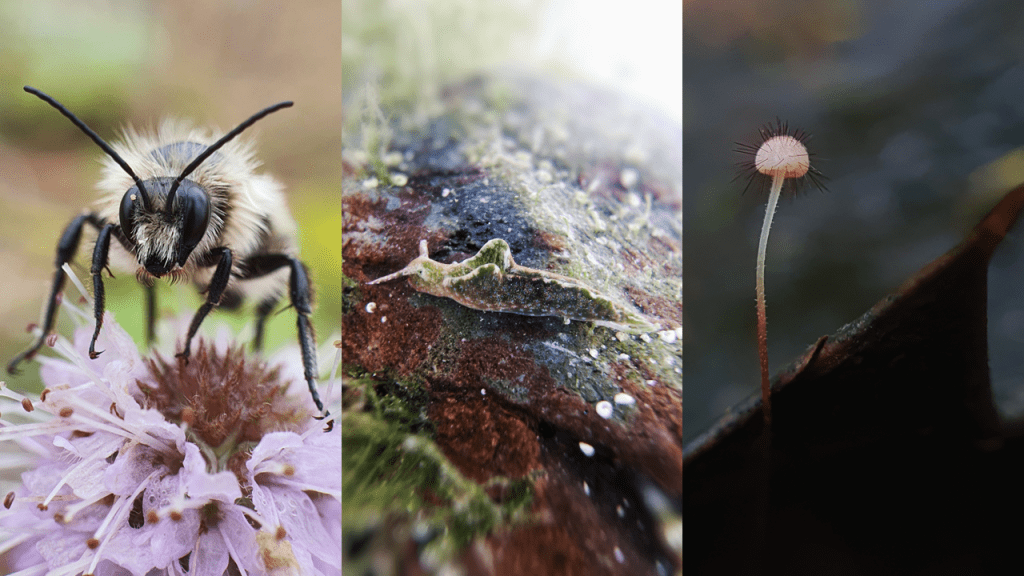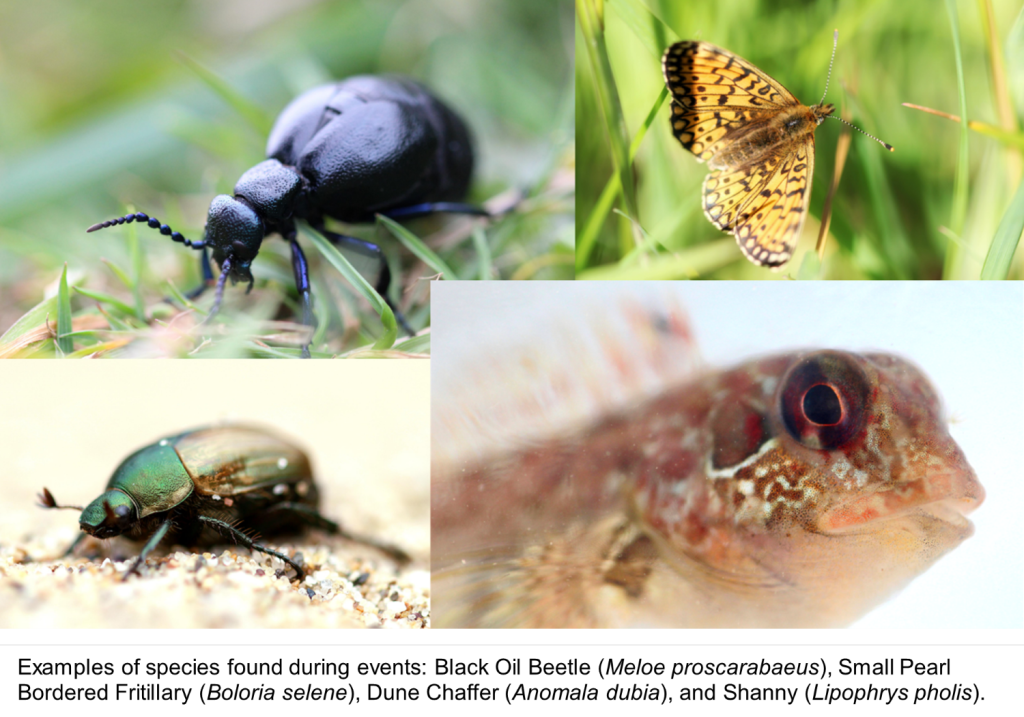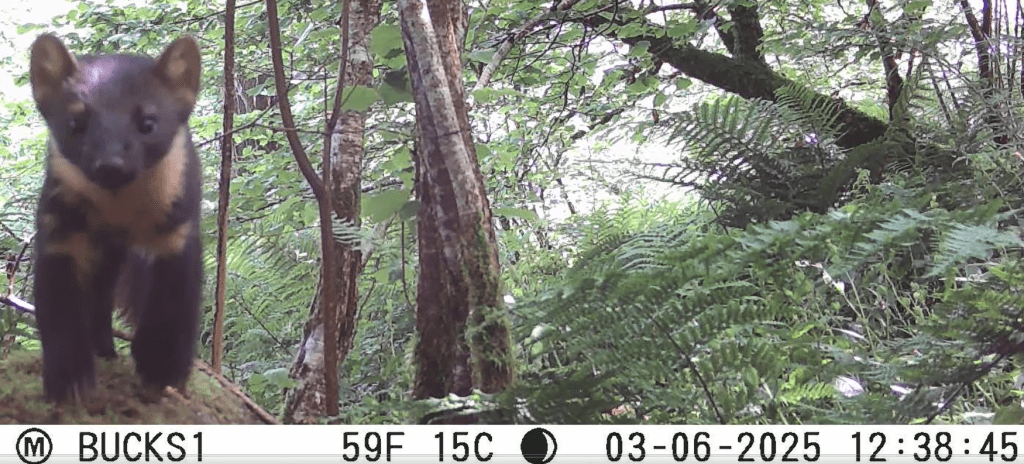Jamie Owen – Finding Nature’s Footprints – Project Assistant – Year 3


I began my work on Finding Nature’s Footprints (FNF) as a volunteer during the project’s first year; helping out and attending events organised by Jamie Buxton-Gould and Joe Newberry. This showed me how special this project was and drove me to apply for the assistant position.
I feel very lucky to have been able to work on FNF with the North Devon Coast National Landscape (NDCNL) team. It has been a wonderful experience helping to preserve, improve, and educate people about the beautiful wildlife of the area I call home. Plus, getting to explore new parts of North Devon has been an immense perk of the job! Sharing my knowledge and passion for ecology and conservation has been highly rewarding, and it’s been a privilege to work alongside (and learn so much from) the various experts and enthusiasts of North Devon’s wildlife conservation scene. Especially when it can become so overwhelming immersing oneself in nature restoration – seeing all the problems wildlife faces, it has been inspiring to meet so many passionate people doing their best for conservation.
I have learned an enormous amount over the course of this year. Particularly when it comes to plant identification, species interventions, and conservation land management for different habitats, e.g., sand dunes, grasslands, woodlands and farmland. I have encountered and learned to identify many species I have never seen before (such as those pictured below), and I’ve been able to learn a great deal more about my primary interest, invertebrates; with my identification skills on moths, dragonflies, and bees improving markedly. On a similar thread, I have thoroughly appreciated the chance to use my photography to engage people with the macro world of wildlife and use these photos to design social media posts for the NDCNL.


Some highlights of my time on FNF would definitely be the practical conservation tasks on Braunton Burrows, Woolacombe Downs, and Hillsborough Nature Reserve. It doesn’t get much better than heading out to a beautiful location on the coast with a team of people, all with a shared interest in nature and eagerness to help with its restoration. The Friends of Hillsborough group are a great example of this. I feel similarly about the time FNF spent supporting Hartland’s Nature Society with their various events and work parties. It feels great to work with people who care so much. Some highlights of my time on FNF would definitely be the practical conservation tasks on Braunton Burrows, Woolacombe Downs, and Hillsborough Nature Reserve. It doesn’t get much better than heading out to a beautiful location on the coast with a team of people, all with a shared interest in nature and eagerness to help with its restoration. The Friends of Hillsborough group are a great example of this. I feel similarly about the time FNF spent supporting Hartland’s Nature Society with their various events and work parties. It feels great to work with people who care so much.

Another highlight of the year would have to be my public speaking work and engagement with school groups. Giving hour-and-a-half lectures on insects/invertebrates, is not something I expected to be doing, nor did I know that I could plan such a long presentation, but I received excellent feedback on my talks and was subsequently invited as a speaker to more events throughout the year. I really got to exercise my public speaking skills, and I now feel more confidence and enjoyment presenting on my area of expertise and interest. It was also super exciting to showcase my photography in long-form, since I regularly shoot invertebrates in my spare time and I have collected hundreds of photos which rarely get to see the light of day! I especially enjoyed teaching lessons on the wildflower and estuarine ecosystems of Northam Burrows to the year 3 and 6 classes of Appledore School for their collaborative Royal Society project. Alongside Rose from Northam Burrows Country Park, Sarah from Appledore school, Martha from the Biosphere, and the project manager Lucy, we planned three lessons for each class, including an introductory presentation, a practical field course, and an outro session. It was extremely rewarding working with these groups of schoolchildren; seeing their enormous enthusiasm and aptitude for ecology gives me hope for the future of North Devon’s (and the UK’s) wildlife. The groups seemed to learn a great deal and according to feedback I became a class favourite, which is one of the biggest compliments I have ever received! I will certainly be looking forward to teaching more primary school classes in the future.
I think I have really found my footing with nature-focused public engagement and informative walk leading. Over the course of the year, I have increased my engagement in this area. I began by supporting rock-pooling events, then eventually came to be organising and leading my own solo wildlife walks for the Ilfracombe U3A and the Out & Wild Festival, and leading bug hunts for FNF’s various Bioblitz and wildlife recording days, which were exceptionally enjoyable. Though, these events were not without challenges for me; the skills to lead groups of people and keep everyone engaged (especially younger audiences) took a while to hone, and having to occasionally oppose misinformation was not always easy. I must admit, I had to overcome some nerves as a leader. It’s one thing being invited to talk to a group of people, but doing so while in the field was more intimidating to me. As was the organisational side of things. Since I have ADHD, I struggle with times, dates, and attention, so these events were difficult for me, especially to begin with. But through practice and support from the project managers Jamie Buxton-Gould and Jess Giblett, I have come on leaps and bounds in this respect.



A final high point of the project for me has been the camera trapping work I led in several of the coastline’s woodlands. Utilizing my camera trapping experience from Borneo, we achieved a 100% success rate in finding wild pine martens (Martes martes; pictured below & left) in these areas, which is something I am hugely proud of and pleased by! It is always so exciting to see which animals pass through the area when you’re not there, and it was highly fulfilling to gather useful data about a rare species and conservation target for the Devon Wildlife Trust and Devon Mammal Group. Using this footage to engage the public was also a lot of fun, since most people have never even heard of a pine marten or if they do, they don’t realise they’re thriving in North Devon!
Overall, my time on FNF has been phenomenal, and I only wish it could go on for an extra five years so I could continue working on the project. I plan to stay within North Devon’s conservation sector, and I hope to again work alongside the wildlife experts of North Devon to deliver practical conservation, ecological teaching, and engagement activities. This work has become extremely important to me over FNF’s three years and my time as assistant. My involvement with the project has given me the appetite, skills, and training to continue my career in this area with confidence. I couldn’t be more grateful to all those involved, especially Jamie Buxton-Gould, and Joe Newberry.



